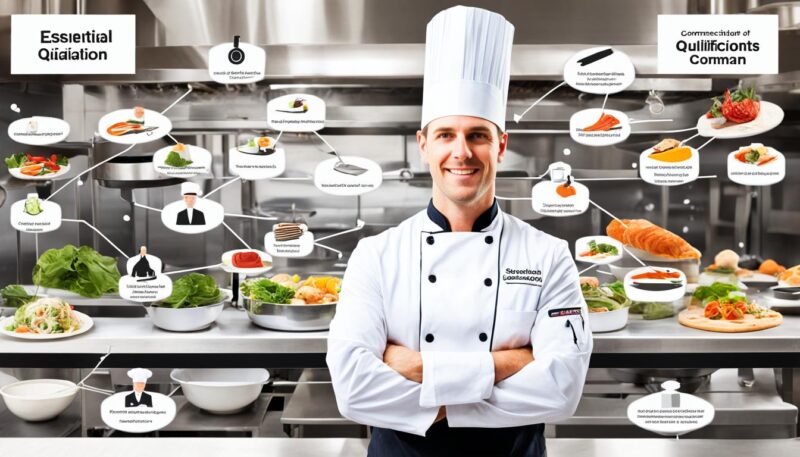The culinary landscape is ever-evolving, demanding a consistent influx of talent and dedication. Within this dynamic arena, the best commis chef job description serves as a crucial roadmap for newcomers eager to embark on their culinary journey. It meticulously addresses the scope and breadth of commis chef responsibilities, outlining the job duties and expectations that define the role’s essence in professional kitchens. As an instrument for clarity, this description is fundamental, not only for aspiring chefs but also for establishments seeking to cultivate a proficient kitchen brigade.
For those at the threshold of their culinary careers, understanding the commis chef job duties is the first step toward mastering the craft. These entry-level professionals play a pivotal support role, deftly balancing their eagerness to learn with the practical requirements of food preparation, adherence to stringent hygiene standards, and the meticulous execution of tasks under the watchful gaze of experienced chefs. The primary functions encapsulate not just the laborious aspects of kitchen maintenance but equally the exhilarating opportunity to absorb wisdom from culinary maestros.
Recognizing the vitality of this foundation is indispensable for businesses aspiring to retain high standards of operation and for neophytes striving to lay down a solid professional groundwork. The best commis chef job description acts as an invaluable selection criterion that draws in passionate individuals ready to wear the toque and wield the whisk, marking the start of a gastronomic voyage underscored by growth, discipline, and creativity.
Key Takeaways
- An effective commis chef job description is pivotal for delineating the role within the culinary industry.
- It thoroughly outlines essential commis chef responsibilities, ensuring candidates understand their expected contributions.
- Aspiring chefs are introduced to the foundational aspects of food preparation and kitchen maintenance.
- Adherence to hygiene and safety standards is a non-negotiable facet of the commis chef’s job duties.
- The description serves as a beacon for those with zeal to learn from experienced chefs and grow in the field.
- For culinary establishments, a well-crafted job description is instrumental in attracting and selecting the right talent.
Understanding the Role of a Commis Chef
The journey into the culinary arts begins with the fundamental positions that shape the kitchen’s operations. A commis chef represents one such pivotal role, initiating newcomers to the critical tasks that maintain a restaurant’s rhythm. Their responsibilities extend from preparatory work to collaborative efforts required to present every dish with excellence.
Introduction to the Position
As the backbone of the kitchen brigade, a commis chef’s entry-level status belies the significance of their contributions. Commonly viewed as an apprenticeship, the role is crafted to provide practical, hands-on experience essential for mastering the culinary arts. Standing at the starting line of their professional journey, commis chefs are expected to be eager learners, flexible in diverse tasks, and resilient in high-pressure environments.
Core Responsibilities and Daily Tasks
Every day in the life of a commis chef is lined with diverse and dynamic responsibilities. The variety of commis chef tasks is designed to breed familiarity with the kitchen’s fast-paced ecosystem.
- Preparation of ingredients, including washing, peeling, cutting, and seasoning;
- Execution of basic cooking duties under the guidance of senior chefs;
- Maintenance of a clean and orderly kitchen by adhering to sanitation standards;
- Stock inventory management to ensure the availability of necessary items;
- Upkeep of kitchen equipment, minimizing downtime due to malfunctions;
- Effective communication and collaboration with the rest of the culinary team;
- Continuous learning of station responsibilities and culinary techniques.
Together, these commis chef job responsibilities form the training grounds for aspiring chefs to grow into seasoned professionals, capable of handling the kitchen’s heat with competence and finesse.
Essential Commis Chef Qualifications
Becoming a commis chef is the first step for many in their culinary careers, and meeting certain commis chef requirements is key to securing this foundational position. The following details outline the necessary qualifications sought by industry employers to ensure their kitchen teams are well-prepared and trained.
Educational Background
A solid educational foundation is often a critical stepping stone towards a successful career in the culinary arts. Employers typically look for the following educational qualifications when hiring a new commis chef:
- High School Diploma or GED equivalent
- Formal training from a culinary arts program
- Associate or Bachelor’s degree in Culinary Arts (preferred by some upscale establishments)
While a formal education in culinary arts is not always mandatory, those who have obtained such qualifications demonstrate a commitment to the craft and are often preferred by employers seeking to fill commis chef positions.
Professional Certifications
In addition to educational qualifications, professional certifications play a significant role in highlighting a candidate’s readiness for the demands of a commercial kitchen. Included below is a list of certifications that can enhance a commis chef’s employability:
| Certification | Description | Provider |
|---|---|---|
| ServSafe Food Handler | Food safety training and certificate program. | National Restaurant Association |
| Certified Culinarian® | Entry-level culinary certification demonstrating fundamental cooking skills. | American Culinary Federation |
| HACCP Certification | Specialized training ensuring food safety through hazard analysis and critical control points. | International HACCP Alliance |
These certifications provide proof of a candidate’s knowledge and aptitude in key areas such as food safety, sanitation, and basic culinary techniques, all of which are crucial commis chef qualifications for thriving in the fast-paced culinary environment.
Adhering to these commis chef requirements not only prepares candidates for the practical aspects of the job but also demonstrates to potential employers a clear dedication to professional growth and a high standard of food service excellence.

Best Commis Chef Job Description
In the bustling heart of a professional kitchen, the role of a commis chef is both foundational and intricate. By clearly defining the commis chef duties and the commis chef skills necessary for the job, employers are able to set clear expectations and recruit individuals who are poised to thrive in this vibrant and challenging environment.
Key Duties and Job Responsibilities
The primary duties of a commis chef often revolve around preliminary food preparation, which can range from washing and cutting vegetables to marinating meats. They must also adhere to recipe instructions and plating guidelines, ensuring consistent quality across all dishes. Additional responsibilities extend to maintaining a clean and organized kitchen station, managing food supplies, and upholding stringent health and safety standards.
To encapsulate the myriad of tasks, a table outlining the key responsibilities can offer clarity to aspiring commis chefs:
| Commis Chef Duty | Description |
|---|---|
| Basic Food Preparation | Executing initial steps in the cooking process, such as sorting, chopping, and peeling ingredients. |
| Plating and Presentation | Arranging and garnishing dishes according to chef’s guidelines and restaurant standards. |
| Kitchen Cleanliness | Ensuring workspaces and utensils are clean and sanitized, aligning with hygiene regulations. |
| Stock Management | Monitoring ingredient inventory and alerting superiors about low stock levels. |
| Equipment Maintenance | Regularly cleaning and maintaining kitchen tools and machinery. |
| Adherence to Recipes | Following exact measurements and cooking techniques to ensure consistent quality. |
Necessary Skills for Success
While commis chef duties are multifold, they are underpinned by a set of skills that enable optimal performance. Proficiency in various cooking methods, understanding of ingredients, and the ability to execute under pressure are foundational. Effective communication allows a commis chef to understand and execute instructions swiftly, while strong time management ensures that tasks are completed within the tight timeframes typical of kitchen operations.
- Effective Communication – Ability to understand and articulate information quickly and accurately.
- Strong Time Management – Balancing speed with efficiency to meet service demands.
- Teamwork Aptitude – Collaborating with fellow kitchen staff to ensure smooth operations.
- Adaptability – Adjusting to menu changes, special requests, and unpredictable kitchen scenarios.
- Attention to Detail – Observing and maintaining standards of quality and presentation.
By highlighting these critical commis chef skills in a job description, restaurants are more likely to attract and develop talent that will rise to the challenges and dynamic nature of the culinary world.
Distinguishing Commis Chef Skills and Competencies
For a commis chef, the skill set required goes beyond the basics of culinary art; it forms the very foundation of their professional development and growth in the kitchen. Essential commis chef skills encompass the ability to perform adept knife work, master basic cooking techniques, and possess a keen understanding of how different ingredients function together to create harmonious dishes. These skills are pivotal as they underpin the quality and execution of food preparation, a primary responsibility of commis chefs as they begin their culinary journey.
However, technical prowess is only one part of the equation. Commis chef competencies involve more intangible yet equally imperative traits such as the capacity to manage high-stress situations commonly associated with fast-paced kitchen environments. It is their creativity that often distinguishes one commis chef from another, with a genuine passion for culinary arts driving their desire to innovate and excel. These competencies not only contribute to a thriving kitchen dynamic but also prepare commis chefs for the rigors and rewards of advanced roles in the culinary hierarchy.
To encapsulate, the role of a commis chef is as demanding as it is rewarding, with a broad array of skills and competencies that need to be highlighted in job descriptions and harnessed in the workplace. When these attributes are effectively conveyed and encouraged, they form the building blocks for commis chefs to refine their craft, gain invaluable experience from seasoned professionals, and climb the culinary ladder to reach new heights of gastronomic expertise.
